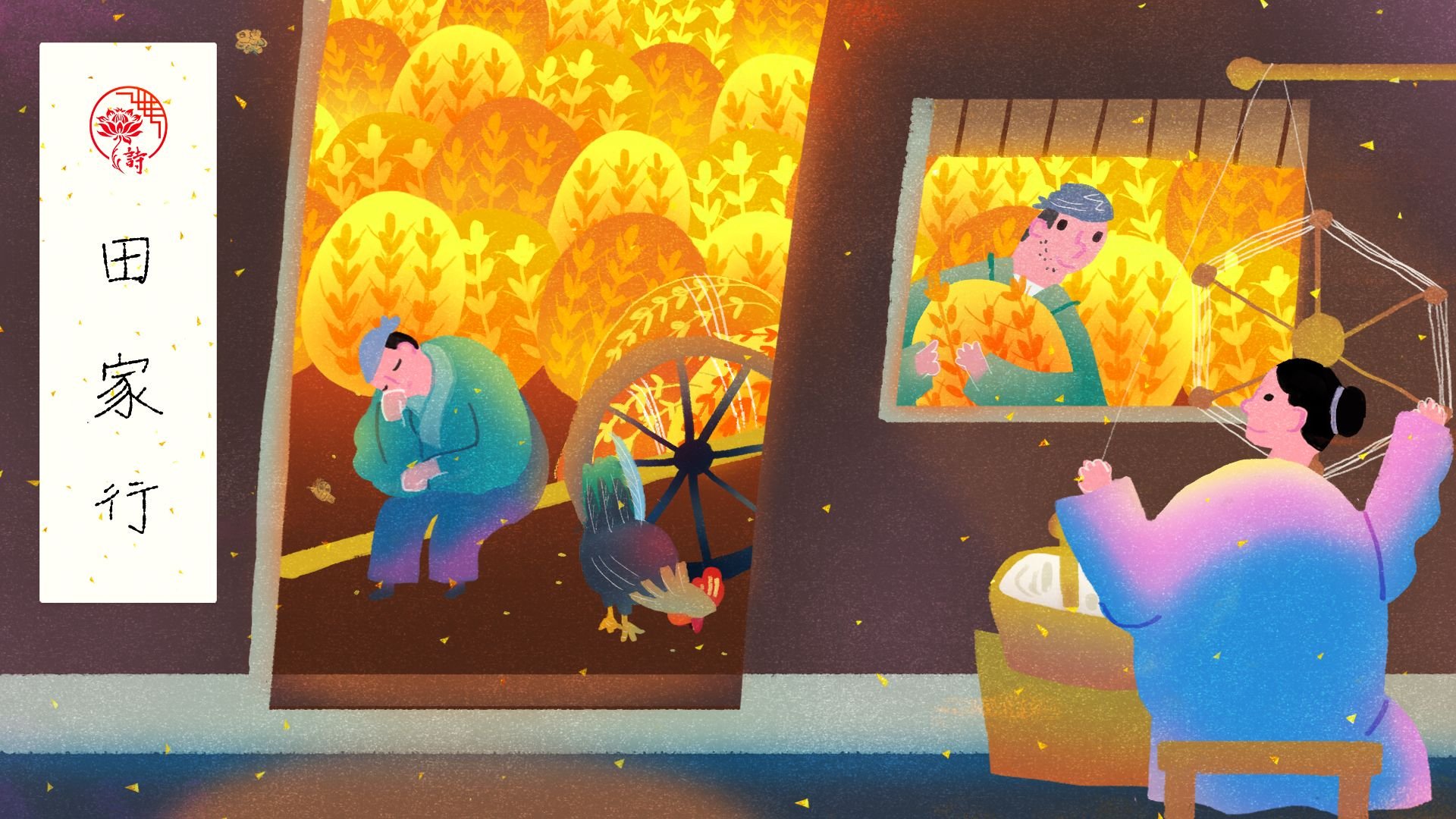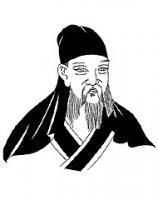Hi everyone, the Chinese Culture Project is back again with another Tang poem. In the past two weeks we’ve introduced “Migration” and “Spring Rain”, what did you think of it? If you have any comments, good or bad, we would love to hear from you. Or if there’s any particular topic that you would like to learn about, let us know so we can work on it. We want this to be an interactive forum where we all learn from one another, so come on, don’t be shy!
The first holiday in May for most countries around the world is Labour Day and this is a much welcomed holiday enjoyed by many of us. Therefore we thought it would apt to introduce a poem this week about the labourers from the old days, “Tián Jiā Xíng” or “Farmers” by Wáng Jiàn.
大家好,《樂筆詩墊》今天又要介紹一首新的唐詩了!之前的兩篇,我們分別介紹了《移居二首》及《春夜喜雨》,不知大家對我們的介紹覺得如何?其實,我們除了希望大家能給予我們更多的意見外,同時也歡迎大家提出任何的主題,或是特定的詩讓我們介紹的!我們不希望只是每週介紹一首詩歌,而更是能與大家多互動,這樣才是真正的文化交流,所以,大家不要吝嗇自己的意見,儘管提出你心中所想吧!
好了,我們要開始介紹唐詩了!時值5月,大家最能夠想起的應該就是國際勞動節了!勞動與我們每個人息息相關,因為我們絕大部份都是勞動者,故在這一週,以勞動為題最是合適不過,在云云與勞動有關的唐詩,我們選擇了王建的《田家行》。

The Background 創作背景:

王建 Wáng Jiàn
May is the beginning of summer and is always a busy time for everyone. It’s time to harvest wheat, and to extract the silk threads from the cocoons produced by the silk worms. Everyone is a busy bee, maybe that’s why we have Labour Day in May!
In the traditional agricultural society, the hard working farmers don’t expect to become affluent through their hard work, all they look forward to is to maintain a decent livelihood. However, it reality, often they find that the fruits of their hard working labour goes to others instead of feeding their own mouths.
Through the poem, Wáng Jiàn describes in a simple and direct way how hard the farmers work at harvest, and what happens to their output after the hard work.
五月正值炎夏,是小麥豐收的時分,理所當然是下田收割的好時候;五月亦是春蠶吐絲的時分,同樣是取絲織布的好時候。總括而言,五月是古代男耕女織一起勞動的大日子,也許這便是勞動節選擇在5月1日的其中一個原因吧!
純樸的農民腳踏實地依靠自己的勞力賺取生活所需,不求大富大貴,但求豐衣足食,然而現實卻是豐收換不來生活水平的改善,反而讓可愛的農民時常陷入貧困、饑寒交迫的生活。
作者王建透過創作<田家行>,以平鋪直敘的淺白語言帶領大家直擊唐朝農民的勞動實況,探究農民勞動所得的血汗成果的最終歸屬。

“Tián Jiā Xíng” / “Farmers” by Wáng Jiàn. 《王建-田家行》

男聲欣欣女顏悅,人家不怨言語別
nán shēng xīn xīn nǚ yán yuè, rén jiā bù yuàn yán yǔ bié
五月雖熱麥風清,檐頭索索繰車鳴
wǔ yuè suī rè mài fēng qīng, yán tóu suǒ suǒ qiāo chē míng
野蠶作繭人不取,葉間撲撲秋蛾生
yě cán zuò jiǎn rén bù qǔ, yè jiān pū pū qiū é shēng
麥收上場絹在軸,的知輸得官家足
mài shōu shàng cháng juàn zài zhóu, dí zhī shū dé guān jiā zú
不望入口覆上身,且免向城賣黃犢
bù wàng rù kǒu fù shàng shēn, qiě miǎn xiàng chéng mài huáng dú
回家衣食無厚薄,不見縣門身即樂
huí jiā yī shí wú hòu báo, bù jiàn xiàn mén shēn jí lè
The Composition 詩句大意:
There are twelve lines in “Tián Jiā Xíng” / “Farmers” and the poem is best understood in four parts.
《田家行》共十二句,按詩的結構劃分,分為四個層次。
Part 1 : The expression and attitude of the farmers 層次一:鄉間農民的精神面貌
男聲欣欣女顏悅,人家不怨言語別
nán shēng xīn xīn nǚ yán yuè, rén jiā bù yuàn yán yǔ bié
At harvest time, all the men are chatting happily and all the women have a cheerful look on their faces. Although they know there’s a of work to do, no one is complaining and their tone of speech is very different from normal
解釋:面臨豐收,男人們的說話充滿了歡欣的語調,女人們的臉容充滿喜悅的神情。每一戶人都沒有勞動的怨言,說著跟往常不一樣的話。
Part 2 : Their happiness at harvest time 層次二:鄉間農民面臨豐收的喜悅
五月雖熱麥風清,檐頭索索繰車鳴
wǔ yuè suī rè mài fēng qīng, yán tóu suǒ suǒ qiāo chē míng
野蠶作繭人不取,葉間撲撲秋蛾生
yě cán zuò jiǎn rén bù qǔ, yè jiān pū pū qiū é shēng
Although it’is very hot in May, the breeze from the wheat is very refreshing. The sounds of ‘sock sock’ can be heard from the machine the women use to extract the silk thread from the cocoons. Since it’s been a good harvest, no one wants the cocoon shells, and they attach to the trees where moths grow and fly around
解釋:五月的天氣雖然炎熱,麥風卻令人感到清涼。在屋檐下,婦女忙着用繰車繅絲,發出一陣陣「索索」的聲音。
由於家蠶豐收,野蠶吐絲而成的繭已經沒有人來撿取,於是繭在樹上蛻變秋蛾,在樹葉間撲撲飛舞。
Part 3 : The sorrow at harvest 層次三:鄉間農民面臨豐收的苦惱
麥收上場絹在軸,的知輸得官家足
mài shōu shàng cháng juàn zài zhóu, dí zhī shū dé guān jiā zú
不望入口覆上身,且免向城賣黃犢
bù wàng rù kǒu fù shàng shēn, qiě miǎn xiàng chéng mài huáng dú
The harvested wheat are placed in baskets, the silk fabric are rolled onto the reels, this year’s harvest should be sufficient to pay the taxes. We don’t expect to eat the wheat or to make new clothes from the silk fabric, we just hope it’s enough for the officials, and that we don’t need to slaughter our cow as well.
麥子收割以後一筐一筐地堆放在麥場上,絹布織成後一匹一匹地纏在軸上,可以確認今年的收成足夠繳納官府的賦稅。
不指望收割來的糧食可以留給自己吃,也不指望織好的絹可以留給自己穿,只希望上繳的勞動成果足夠,能免除到城裏把初生的小黃牛都賣掉吧!
Part 4 : Making the best of the situation 層次四:鄉間農民的苦中作樂
回家衣食無厚薄,不見縣門身即樂
huí jiā yī shí wú hòu báo, bù jiàn xiàn mén shēn jí lè
It doesn’t matter if we don’t have a lavish lifestyle, as long as we aren’t summoned to see the officials, then we shall be very happy and content.
不計較家中能否吃得好穿得好,只要不用進縣裡的衙門見官,已經感到足夠幸福了。

The poetic structure 格律特點:
Sentence 句式
The poem has 12 lines and each line has 7 words, and is more in line with the free format poem style from the Music Bureau or Yuefu era. It has a regulated structure of 7 words in each line, but no rhythm, so is classified as a 7 word ancient style poem.
《田家行》全詩共十二句,不符合絕詩的四句規範,亦不符合律詩的八句規範。每句均是工整的七個字,可先斷定為「七言古詩」。
Rhythm 押韻
If we look at the last word on each even line, they have different finals in both cantonese and mandarin. None of the finals are the same or even similar so they don’t fit the strict rhythm requirement of lushi.
The poem is quite typical of they Yuefu style, where it describes the realistics of everyday life. Wáng Jiàn uses simple direct words to reflect the happiness of the farmers when they know it will be a good harvest, and then their distress in knowing that happiness is just temporary, and accepting the realities of being so powerless in life.
先選取雙句句末的字作韻母分析,即「別」、「鳴」、「生」、「足」、「犢」、「樂」。「別」的粵音韻母是「it」,普通話韻母是「ie」;「鳴」的粵音及普通話韻母是「ing」;「生」的粵音韻母是「ang」、普通話韻母是「eng」;「足」與「犢」的粵音韻母是「uk」、普通話韻母是「u」;「樂」的粵音韻母是「ok」、普通話韻母是「e」。綜合而言,雙句句末並非選用相同或相近的韻母,因此不符合絕詩及律詩雙數句末押韻的要求,比較貼近用韻要求較自由的樂府詩。
本詩句式整齊,未有嚴格的用韻要求,屬於樂府古詩中「歌行體」的「七言古詩」,保留了古樂府敘事的特點。從《田家行》可見,並無特別深奧的用字,淺白地敘述中唐時期農民面臨豐收的先喜後悲,非常寫實地反映農民的勞動成果被無情剝削。

Highlight from the poem 精選句子:

五月雖熱麥風清,檐頭索索繰車鳴
wǔ yuè suī rè mài fēng qīng, yán tóu suǒ suǒ qiāo chē míng
Although it’is very hot in May, the breeze from the wheat is very refreshing. The sounds of ‘sock sock’ can be heard from the machine the women use to extract the silk thread from the cocoons.
The beauty of this poem is the attitude of the farmers. Although everyone knows the good harvest is just a temporary wealth for them and that it will end up in someone else’s pocket very soon, they still enjoy the whole process. The Chinese has a saying which translates to , “People feel more upbeat when there is a cause for celebration”. Whenever the farmers think of the moment of joy at harvest, they immediately forget about the hard work involved and embrace this beautiful moment.
鄉間農民是中國最可愛純樸的一群勞動階層,即使他們早已預知豐收只是鏡花水月,所獲的小麥與蠶絲織成的絹絕大部份都需要上繳賦稅,他們依然很享受收獲勞動成果的一刻。能夠在炎熱的夏天感到無比清涼,這便是中國人所說的「人逢喜事精神爽」,只要想起收割一刻的滿滿收獲,足以讓農民忘卻夏日勞動的辛勞,喜悅地投入勞動生活。

If you can’t watch Dlive, you may watch our music video on Youtube
The Mandarin part of the music this week for “Tián Jiā Xíng” / “Farmers” is sang by the virtual singer Miku V4, and the Cantonese part is sang by @tine. Have you noticed that a lot of folk songs, or songs sang by the working class all have an upbeat happy tune? Maybe it’s because they’re all enjoying the rewards after the hard work. Our music this weeks takes on a similar style, but you can style find a hint of sorrowness embedded in there.
如果你看不到Dlive,也可從Youtube欣賞我們的音樂視頻。
這一首《田家行》的普通話仍是由世界第一位虛擬歌手初音主唱,而粵語則由@tine 主唱。不知大家有沒有留意,很多勞動階層的音樂,即民間音樂,包括鄉村音樂、藍調、藍草、民族音樂等,都是偏向快樂的音樂。這可能是因為他們都享受著勞動後的快樂。故這一首《田家行》也走向了快樂的路線。
不過,快樂不是完全的快樂,倒有點苦中作樂的味道......

In the modern day life, the majority of us still have to work and look forward to payday every month. The pay may not be as much as we would like and most of it will go on food and bills very soon. However, there is still a pang of joy when it actually lands in our bank account. On Steemit, we all work very hard on our posts, and after it’s published we wait eagerly for an upvote, comment or resteem, an acknowledgement of the hard work we’ve put it.
In the hot summer month of May, most of us will probably grab a cold beer or cocktail to reward ourselves after all the hard work. So next week, our poem will be about wine. Don’t forget to come back and check it out. As always, thanks for your support!
我們作為社會中的勞動階層,最期待也是收獲勞動成果的一刻,也就是每月支薪的那一天。也許薪水微薄,而且很快便要用來支付排山倒海的帳單,但在支薪的當天依然充滿歡愉的心情。在Steemit的世界裡,大家費煞思量創作一篇文章,也期待著發文後獲得大眾的認可,無論是upvote、comment、resteem。我們其實都有著一顆勞動階層付出努力並期待收獲的心。
炎熱的五月到了,祝福各位付出的勞力都能獲得滿意的成果,勞力過後,大家希望幹什麼?我相信很多人一定會選擇喝一杯冰涼的啤酒!故此,下一週我們將會以酒為題,大家不要錯過。最後也希望大家繼續支持CCPHK,認同我們付出的努力,感謝你們的閱讀!
Production Team 製作團隊
Literature Guide 導讀: @perlia
Literature Translation 詩歌解析: @perlia
Music 音樂: @kona
Art 插圖: @nanosesame
Video 視頻: @aaronli
English Editor 英語編輯: @livinguktaiwan
Chinese Editor 中文編輯: @aaronli

My video is at DLive
